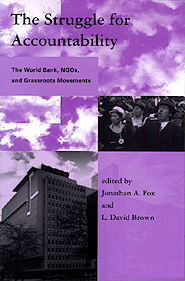![[Currents header graphic]](http://www.ucsc.edu/homeart/currents_header.gif)
![[Currents header graphic]](http://www.ucsc.edu/homeart/currents_header.gif)
November 9, 1998
For many years, the World Bank has been the target of protests against its most notorious megaprojects, including dams that displace tens of thousands of people and roads that have sped up the destruction of the world's rain forests. More than a decade ago, pressure from grassroots groups and transnational coalitions contributed to the putative "greening" of the World Bank, which declared itself a leading force for "environmentally sustainable development."

|
|
Jonathan Fox's new book
|
But has the World Bank really changed the way it does business? A new book provides the first comprehensive analysis of the bank's performance in the wake of internal reform efforts, and it examines the interplay of the bank and its many critics around the world.
"If you categorize the bank's projects as 'the good, the bad, and the ugly,' there are more good projects today than 10 years ago, fewer ugly projects, and still lots of bad projects," said Jonathan Fox, coeditor of The Struggle for Accountability: The World Bank, NGOs, and Grassroots Movements (Cambridge, MA: MIT Press, 1998). "On balance, many of the bank's promises remain unfulfilled, but more of the nasty megaprojects are being shot down before they are built."
Fox, an associate professor of Latin American and Latino studies at UCSC, collaborated on the book with L. David Brown, a professor of organizational behavior at Boston University's School of Management.
Fox and Brown conclude that new reform policies have had "important, partial, and uneven impact" on the actual operations of the World Bank, which is the largest and most influential international development agency, lending about $20 billion annually. Co-owned and managed by member governments, the World Bank was established to reduce poverty around the world.
"We wanted to explain why the World Bank now has enlightened-sounding policies and to assess whether the bank is actually following them in practice. Independent evaluations can contribute to changes in the way development money is spent," said Fox. "Plus, unless critics of the bank figure out where they're having an impact, they won't know what strategies are most effective."
The Struggle for Accountability describes the organizations and movements that have put pressure on the bank and details several projects that triggered major opposition. The book also examines the bank's record of reform in four specific areas: the rights of indigenous peoples, involuntary resettlement, water resources, and internal bank changes that were supposed to encourage public accountability.
The editors conclude that critics of specific projects have had more impact on subsequent policies than on the particular projects they were fighting. And they encourage public-interest groups to focus their efforts on holding member governments accountable--both donors and borrowers.
The editors also urge bank critics to acknowledge bank staff members who are working internally for reform. These "insider reformists" are de facto partners with outsider critics, noted Fox.
But Fox says real reform at the World Bank remains elusive. "Real institutional change won't happen until individual bank managers and economists are held responsible for the devastation they contribute to," said Fox. "The bank's internal incentive structure rewards moving the money out. Staff incentives don't reward social and environmental reforms."
And the current global economic crisis presents a new threat to reform at the World Bank.
"Wall Street and the United States Treasury are trying to convert the World Bank to a junior International Monetary Fund, providing short-term bailouts and pumping up failing banking systems," said Fox. "Unlike the IMF, which was established to provide short-term crisis management, the World Bank is supposed to fund long-term development. We'll see if it can resist the pressure."